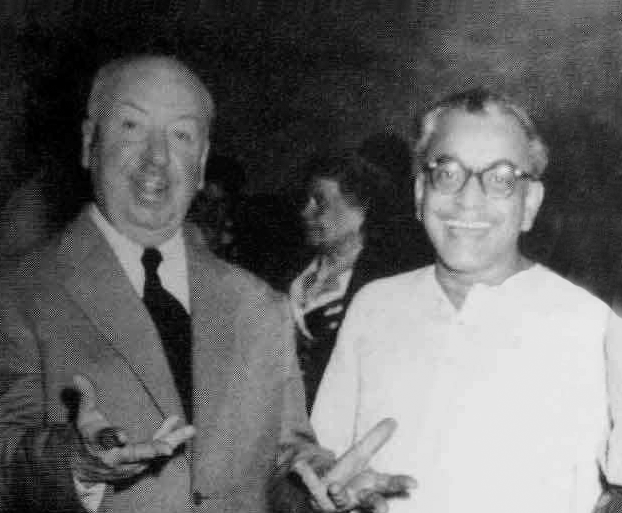Ask Bengalis to name their favourite comedy film of all times and prompt comes the answer Sare Chuattor. Ask again to mention the director’s name, they will draw a blank. That familiar phrase ‘’Bangali atmobismrito jaati” (Bengalis are forgetful about the self) rings in mind.
Director Nirmal Dey, the maker of Sare Chuattor, not only gave Bengal’s greatest superstar, Mahanayak Uttam Kumar, his first hit, but also created the iconic Uttam-Suchitra pair onscreen. Indeed, Dey’s contribution to Bengali cinema is immense. His films are secure in Bengali popular culture but the man himself has slipped into oblivion.
Born in Mymensingh (Bangladesh), in undivided India in 1918, Dey graduated from the Govt. College of Art, Kolkata, before he joined as an assistant to Bimal Roy, who was a cinematographer at the time. It was under Roy’s tutelage that Dey honed his filmmaking skills.
It so happened that a mutual friend introduced Dey to writer Jyotirmoy Roy. Impressed with the young litterateur’s gift of the gab, Dey convinced Jyotirmoy to write for films and later introduced him to Bimal Roy, who was looking for a suitable story for his directorial debut at the New Theatres Studio. Jyotirmoy penned the story and dialogues for him. The formidable team, Bimal Roy, Jyotirmoy and Dey created the historic drama, Udayer Pathey(Towards the Light), for which Dey worked as the film’s associate cinematographer & associate screenplay-writer with Bimal Roy. The result was the phenomenal bilingual Udayer Pathey (Hamrahi) in 1944. With its release, Udayer Pathey revolutionized Indian cinema. In the words of Satyajit Ray: “With his very first film Udayer Pathey, Bimal Roy was able to sweep aside the cobwebs of old tradition and introduce realism and subtlety wholly suited to cinema. Bimal Roy was undoubtedly a pioneer.”
While working with Bimal Roy, Dey simultaneously worked as an independent cinematographer at the erstwhile Eastern Studios, Bombay, in the late 1940s. His recognition as a cinematographer inspired Dey to direct. Dey’s directorial debut, Bedeni(The Gypsy Girl), was however abandoned after the producer’s funds dried. To his good fortune, producer Muralidhar Chattopadhyay of the erstwhile M.P Studios noticed Dey’s directorial brilliance and offered him to direct Basu Paribar (The Basu Family).
Starring a bunch of newcomers, Dey’s family drama Basu Paribar struck gold at the box office. Its success provided the much-needed fillip for its protagonist, Uttam Kumar, who had earned the uncomplimentary nickname of Flop Master General after a string of flops and was about to quit films when he bounced back on the saddle.
Dey’s sophomore release Sare Chuattor(Seventy Four and Half), an ensemble comedy, met with even greater success. Not only did the film launch Bengal’s most famous on-screen romantic pair of Uttam-Suchitra, but also it brought forward several talented character actors into the limelight.
Sare Chuattor was followed by yet another superhit Chnapadangar Bou(The Bride of Chnapadanga). The hattrick of box-office successes established Dey’s name in the pantheon of Tollywood directors. Soon Bollywood came calling in the form of the famous Filmistan Studios, who signed him up for several movies. Within few days of shooting Hum Hindustani (remake of Basu Paribar) personal tragedy struck Dey as his younger daughter died of smallpox.
Dey severed ties with the film industry after this. He even let go of his lucrative Filmistan contract. His comeback was years later with the poignant film Nirdharita Shilpir Anupasthitite(In The Absence Of The Scheduled Artist), that saw the renowned Bengali comedian Bhanu Bandopadhyay in a serious avatar.
Incidentally, Dey shared a close relationship with Dilip Kumar. Unknown to all, Dey worked on the script of at least two films starring Dilip Kumar, Ram Aur Shyam and Gopi. He even appeared in a cameo as the advocate, Mr. Sen in Ram aur Shyam. Despite such active participation, he did not get any credit for these films. Another individual Dey shared a good rapport with was the famous producer S.Mukherjee. This resulted in his writing the screenplay of the superhit Shagird.
On the eve of Swami Vivekananda birth centenary, Dey’s relationship with the Bimal Roy Productions was re-established, as Roy asked him to direct a commissioned documentary on Swami Vivekananda for the Films Division of India. The Life and Message of Swami Vivekananda was his last credited work as a director. Dey died of heart attack four years later.
Nirmal Dey’s emergence coincided with India’s Partition. The Partition ravaged Bengali film industry was still to witness the birth of the holy trinity of Ray-Ghatak-Sen. In an industry where most of the practitioners choose to repeat their hit formulae for box-office success, Dey re-invented himself continuously by experimenting different genres. After directing one of the most enduring comedies of all time, he directed just one more comedy during his lifetime.
Dey was regarded highly by his contemporaries. He is mentioned in several essays and public speeches by Satyajit Ray, who hailed him as one of the finest filmmakers of the post-Independence era in popular Bengali cinema. Uttam Kumar stated that it was Dey who mentored him the basic nuances of film acting. Dey’s team of assistants boasted of renowned names. Many became major film practitioners for example, Ritwik Ghatak, Radhu Karmakar, Jaywant Pathare, Salil Sen to mention a few.
Dey’s invisibility may be partly blamed to the unfortunate tendency of modern Bengali film commentators who undermine, even ignore, the contribution of yesteryear filmmakers, barring a handful.
Like Dey, few filmmakers could relate to the sense and sensibilities of the Bengali middle class. His unpretentious films did not stray from reality and remained rooted in the middle-class ethos. Without resorting to sermonising, he remained true to the mantra of entertaining his audience, giving them the option of healthy distraction. Indeed Dey could make his viewers believe there is a silver lining at the end of every cloud – light at the end of the tunnel.
Filmography (as a director) : 1952: Basu Paribar, 1953: Sare Chuattor,
1954: Chnapadangar Bou, 1955: Dujanaye, 1959: Nirdharita Shilpir Anupasthitite, 1960: Biyer Khaata,
1964: The Life and Message of Swami Vivekananda, 1970: Samantaral(completed by Guru Bagchi)
Abir Bhattacharya
Translated and abridged from the writer’s original Bengali article
Acknowledgements: Jyoti Dey, Gautam Banerjee
Photo Caption: Nirmal Dey with Alfred Hitchcock at the Lighthouse Movie Theatre, Kolkata, circa 1955
Photo Edited by: Syamantak Chattopadhyay


